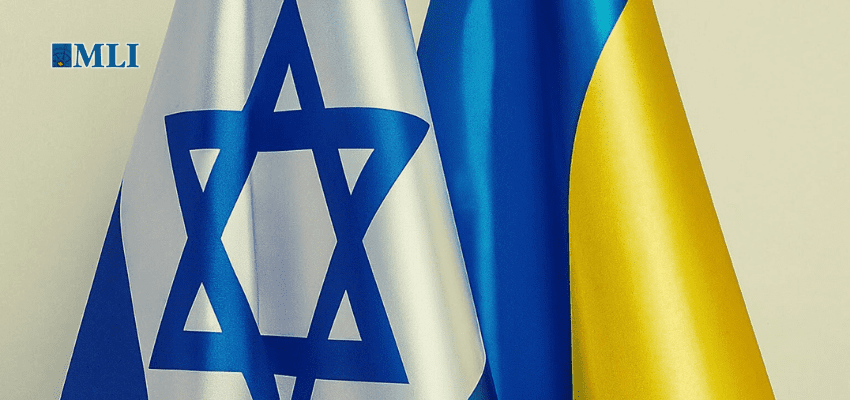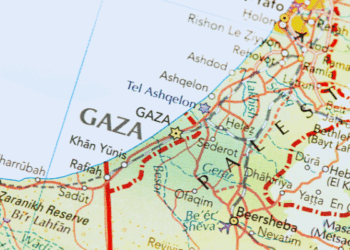This article originally appeared in the National Post.
By Alan Kessel and Casey Babb, April 14, 2025
The wars in Ukraine and Gaza are not isolated regional conflicts. They are existential battles that will determine the future of the world order.
In both cases, authoritarian forces — Russia in Ukraine, Iran and its proxies in the Middle East — are testing the resolve of western democracies. Yet, instead of responding with a unified strategy, the United States and Canada have taken diverging approaches: Washington prioritizing Israel while retreating from Ukraine, while Ottawa does the reverse.
This inconsistency reflects a broader strategic paralysis in the West that emboldens adversaries and weakens the democratic world. Despite strained relations between Canada and the U.S., the two countries should unite and start treating Ukraine and Israel as two fronts in the same war against authoritarian aggression. Doing so would not only send a strong signal to our enemies, it would pave the way for greater cohesion between western nations.
It’s no secret that U.S. President Donald Trump’s return to power has reshaped America’s foreign-policy priorities. While staunchly pro-Israel, the administration has significantly scaled back support for Ukraine. Aid packages for Kyiv have stalled, and Trump’s rhetoric suggests a willingness to force Ukraine into an unfavourable peace, freezing the conflict in a way that benefits Russian President Vladimir Putin.
Trump’s skepticism toward NATO further complicates the situation. His statements questioning the alliance’s relevance have emboldened Russia, which now sees an opportunity to exploit the West’s dysfunction. European countries, recognizing this risk, have stepped up support for Ukraine, but without sustained U.S. backing, Kyiv faces an uphill battle.
Meanwhile, Trump has strengthened U.S. support for Israel. Washington has continued military aid, backed Israeli operations against Hamas and signalled strong opposition to Iran’s regional ambitions. This approach reflects Trump’s worldview: prioritize strong bilateral relationships while disengaging from multilateral commitments.
But selective engagement creates vulnerabilities. If Ukraine collapses or is forced into a settlement that rewards Russian aggression, it will embolden Moscow to push further into eastern Europe. At the same time, Iran and its proxies — keenly aware of Trump’s unwavering support for Israel — may escalate their attacks elsewhere, knowing that the U.S. lacks the same commitment to Ukraine.
Canada has taken the opposite approach. Liberal Leader Mark Carney has reaffirmed his intention to provide assistance to Ukraine and continue putting pressure on Russia. Yet Carney’s government, much like Prime Minister Justin Trudeau’s before it, maintains a cautious stance toward Israel.
While Canada has condemned Hamas’s actions, it typically does so in statements that also condemn Israel — creating a moral equivalence between terrorist organizations that have murdered Canadians and a sovereign member state of the United Nations.
Canada has also stopped short of offering full-throated support for Israel’s military response. Carney has even suggested he agrees with the dangerous and outlandish claim that Israel is committing genocide in Gaza. In addition, Ottawa has been hesitant to align with Washington’s more aggressive stance toward Iran, preferring a diplomatic approach.
Domestic politics play a role in this positioning. Canada’s large Ukrainian diaspora — one of the biggest in the world — ensures that support for Kyiv is a near-universal political consensus. By contrast, the Israeli-Palestinian conflict is deeply polarizing, with large segments of the Liberal electorate critical of Israeli policy. To avoid alienating key voter blocs, Carney has opted for a middle ground that lacks strategic coherence or vision.
But if Israel faces another escalation from Iran or Hezbollah, or if Washington pressures allies to align more closely with its pro-Israel position, Canada may be forced to choose between diplomatic neutrality and its alliance with the U.S. A failure to support Israel could deepen divisions within the western alliance.
Ultimately, the U.S. and Canada’s opposing priorities are self-defeating. The same adversaries are behind both conflicts. Tehran supplies Moscow with drones and other advanced military equipment to sustain its war against Ukraine, while Russia has provided Iran with military aircraft, intelligence and assistance in bypassing sanctions.
In addition, both countries seek to undermine the West by draining its resources, eroding its unity and proving that democracies lack the will to fight. If the West cannot recognize this interconnected challenge, it will remain a step behind its adversaries.
This division also fuels cynicism among allies. In eastern Europe, there is growing frustration that the U.S. prioritizes Israel over Ukraine. In the Middle East, there is anger that western countries that rush to defend Ukraine show hesitation when Israel is attacked. These perceptions matter. They shape alliances and determine how willing nations will be to stand with the West in future crises.
Moreover, failing to support both Ukraine and Israel weakens deterrence elsewhere. Nowhere is this clearer than in Taiwan. China watches how the U.S. and its allies handle these conflicts. A western failure to sustain Ukraine would reinforce Beijing’s belief that the U.S. will not intervene forcefully if Taiwan is attacked. Taiwan is now more vulnerable than ever.
All told, the West does not have the luxury of picking its battles. The U.S. should not allow domestic politics to weaken Ukraine’s war effort, and Canada must overcome its reluctance to fully support Israel — its strongest and oldest regional ally.
Instead of reacting to crises as they arise, the West must proactively strengthen deterrence against authoritarian actors. This means permanent military aid for Ukraine and Israel, enhanced NATO co-ordination in eastern Europe and a clearer containment strategy for Iran.
If the West cannot muster the will to defend Ukraine and Israel simultaneously, it will lose more than two wars — it will lose its credibility, its deterrence and, ultimately, its global leadership.
Alan Kessel is a former legal adviser to the Government of Canada and deputy high commissioner of Canada to the United Kingdom.
Casey Babb is a senior fellow at the Macdonald-Laurier Institute’s Center for North American Prosperity and Security, a fellow with the Institute for National Security Studies in Tel Aviv and and advisor to Secure Canada in Toronto.
The author of this piece has worked independently and is solely responsible for the views presented here. The opinions are not necessarily those of the Macdonald-Laurier Institute, its directors or supporters. The Macdonald-Laurier Institute is non-partisan and neither endorses nor supports candidates or political parties. We encourage our senior fellows to comment on public policy issues, including during election campaigns, but the publication of such expert commentary should not be confused with the institute taking a position for or against any party or candidate.






